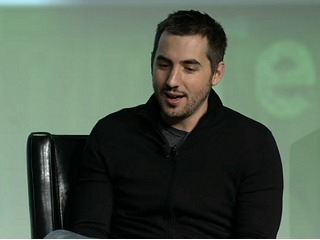Rising infertility concerns fuel growth of male-focused innovative startups
Fertility treatments are more relevant than ever; here are a few startups pioneering new solutions
Read more...
When Groupon founder and CEO Andrew Mason was fired last week, he wrote a fairly self-effacing goodbye note to Groupon employees, in which he took responsibility for the problems the company had been having lately.
There was part of the note, though, where Mason said something that I thought was very interesting: despite taking the blame, he also implied that he should also be given credit for taking the company as far as he did.
"For those who are concerned about me, please don't be - I love Groupon, and I'm terribly proud of what we've created. I'm OK with having failed at this part of the journey. If Groupon was Battletoads, it would be like I made it all the way to the Terra Tubes without dying on my first ever play through. I am so lucky to have had the opportunity to take the company this far with all of you," he wrote.
Translation: I may not have been perfect, but I took this company public, so at least give me credit for that.
I have personally never been in the situation, but I can imagine that if someone asked me to run a company I wouldn't even know where to begin. So Mason is right that he should be given some credit for being a young founder and CEO who was able to stay with his company and see it through the IPO process.
But what I also found myself wondering was if it was actually all that rare for a founder to still be in charge when their company goes public? Are most founders able to stay in the role of CEO long enough, or do they more often cede control to another, more experienced CEO?
The last 100 consumer Internet IPOs
To get the answer, let's take a look at some of the most famous cases.
The most recent example of a famous founder becoming CEO and then riding it to an IPO is Facebook's Mark Zuckerberg, who took his company public in May of last year.
There is also Amazon's Jeff Bezos, Marc Benioff of SalesForce, Yahoo's Jerry Yang, Bill Gates of Microsoft, Michael Dell of Dell Computers and Larry Ellison of Oracle. All of these founders were the CEOs of their companies, and guided them to becoming publically traded.
You may be thinking that the above founders are outliers, and that most do not do this but the stats prove otherwise.
Since 1996, 100 consumer Internet companies have gone public, beginning with the IPO of CBS Interactive in 1996 and ending with the IPO of Shutterstock in October of 2012. And of those 100 companies, more than half of them had one of their founders holding the position of CEO when the company went public, according to data supplied to VatorNews from Dow Jones VentureSource.
In all, 56 of the last 100 consumer Internet companies that went public were still being headed by one of their founders, and a majority of those CEOs held multiple positions in the company as well.
Of the CEOs on that list, 21 of the them held that position alone, including Jeremy Allaire from Brightcove; Daniel Hafner from Kayak; Jeremy Stoppelman from Yelp; Mark Pincus from Zynga; and Spencer Rascoff of Zillow.
Of the remaining 35 CEOS, 16 of them were both the Chairman of Board at their company, along with being the CEO. They include Peter Flint of Trulia; Reed Hastings of Netflix; Jonathan Oringer of Shutterstock; Martha Stewart of Martha Stewart Living Omnimedia; and Mark Zuckerberg of Facebook all held these two positions.
Another 12 of the CEOs also held the position of President, including William Oesterle of Angie's List; Brian Sharples of HomeAway and Richard Rosenblatt of Demand Media.
And, perhaps most impressive of all were the seven CEOs that held all three positions: CEO, Chairman and President. These were Michael Jewell of Celebrate Express; Bahram Akradi of Life Time Fitness; Mark Vadon of Blue Nile; Randall Zanatta of Golf Galaxy; John Diebel of Meade Instruments; Bruce Twickler of Andover.net; and Jason Olim of CDnow.
There were only a few on the list, three in all, who had been CEO of their company at one point who did not make it all the way to their company's IPO. They were Robert Rosenschein of Answers Corp; Kenneth Berquist of TechTarget; and Stephen Gordon of Restoration Hardware Holdings.
Most founders, it seems, want to be the CEOs of their companies, and for good reason.
Mason's sentiment reminded me of something that Digg co-founder Kevin Rose said last year about being young and forced to deal with the prospect of running a company.
“It’s very easy when you’re first starting out as a younger entrepreneur in your early 20s, and you’ve never done this before, to say, ‘I don’t think I can be the CEO and I want to give control of my business to someone else.'"
But, he continued, "you have to realize when you’re giving away control of your business to someone else, like, even though you’re still the founder, you’re actually giving them the power to make a lot of decisions in your company.
Ultimately, a founder wants to be the CEO since they want to take the company in the direction they invisioned, and don't want to risk putting the wrong person in charge.
So how much credit does Andrew Mason deserve?
The answer is simple: Yes, Andrew Mason should absolutely get some credit for sticking with Groupon, even though many other CEOs have done the same thing, with some even holding down mutliple jobs in their own companies, which Mason did not do.
Like I said above, its probably easy to pass on the major responsibilities to someone more experienced or well connected, and harder to throw yourself into such a big role without a net to catch you.
At the same time, Mason deserves an equal amount of the blame for what happened to the company after its IPO.
As Mason said himself in his goodbye letter, "From controversial metrics in our S1 to our material weakness to two quarters of missing our own expectations and a stock price that's hovering around one quarter of our listing price, the events of the last year and a half speak for themselves. As CEO, I am accountable."
(Image source: https://www.celebritynetworth.com)
Fertility treatments are more relevant than ever; here are a few startups pioneering new solutions
Read more...After a trial in select locations, Elon Musk is expanding its fee to more X users
Read more...The tools include content such as educational videos, recipes, and daily nutrition tips
Read more...Startup/Business
Joined Vator on
Digg is a user driven social content website. Everything on Digg is user-submitted. After you submit content, other people read your submission and “Digg” what they like best. If your story receives enough Diggs, it’s promoted to the front page for other visitors to see.
Digg has been a force ever since. Acquisition offers have been made, Rose was on the cover of BusinessWeek and according to Alexa, Digg is in the top 100 most trafficked sites on the internet. The success hasn’t come without its share of problems though. The site has had to face services aimed at gaming the way stories hit the front page, as well as a user revolt. Digg has however been able to get over these hurdles as it continues to be one of the social news leaders.
Startup/Business
Joined Vator on
Zynga is the largest social gaming company with 8.5 million daily users and 45 million monthly users. Zynga’s games are available on Facebook, MySpace, Bebo, Hi5, Friendster, Yahoo! and the iPhone, and include Texas Hold’Em Poker, Mafia Wars, YoVille, Vampires, Street Racing, Scramble and Word Twist. The company is funded by Kleiner Perkins Caufield & Byers, IVP, Union Square Ventures, Foundry Group, Avalon Ventures, Pilot Group, Reid Hoffman and Peter Thiel. Zynga is headquartered at the Chip Factory in San Francisco. For more information, please visit www.zynga.com.
Startup/Business
Joined Vator on
Yelp is the fun and easy way to find, review and talk about what's great (and not so great) in your world. You already know that asking friends is the best way to find restaurants, dentists, hairstylists, and anything local. Yelp makes it fast and easy by collecting and organizing your friends' recommendations in one convenient place.
...the ultimate city guide that taps into the community's voice and reveals honest and current insights on local businesses and services on everything from martinis to mechanics.
...just real people, writing real reviews, and that's the real deal.
...a fun and engaging place for passionate and opinionated influencers to share the experiences they've had with local businesses and services.
...the definitive local guide in the San Francisco Bay Area and a force to be reckoned with in Chicago, New York, Boston, Los Angeles and Seattle. But really, we're everywhere. From Austin to Madison and everywhere in between, reviews are coming in from all over the country!
...word of mouth marketing - amplified. Savvy local marketers now have a great channel to effectively target local consumers.
Since July 2004, co-founders Jeremy Stoppelman (CEO) and Russel Simmons (CTO) and their Yelp crew have been striving to make life better for people who love to patronize great local businesses. Discovering accurate information on local establishments has never been this entertaining. Writing reviews has never been this fun, easy and addictive!
Startup/Business
Joined Vator on
Demand Media is building a different type of new media company. With a proprietary media platform that powers the company's highly-trafficked domains and wholly-owned content media properties, Demand Media leverages cutting edge, user-driven publishing, community and monetization tools in its quest to define the next generation of new media companies.
Startup/Business
Joined Vator on
Brightcove is an Internet TV platform.
We're dedicated to harnessing the inherent power of the Internet to transform the distribution and consumption of media.
Brightcove empowers content owners—from independent producers to major broadcast networks—to reach their audiences directly through the Internet. At the same time, we help web publishers enrich their sites with syndicated video programming, and we give marketers more ways to communicate and engage with their consumers.
Most importantly, we give people the freedom to easily find, watch and participate in a broad range of video content—when and where they choose.

Joined Vator on

Joined Vator on

Joined Vator on

Joined Vator on

Joined Vator on



